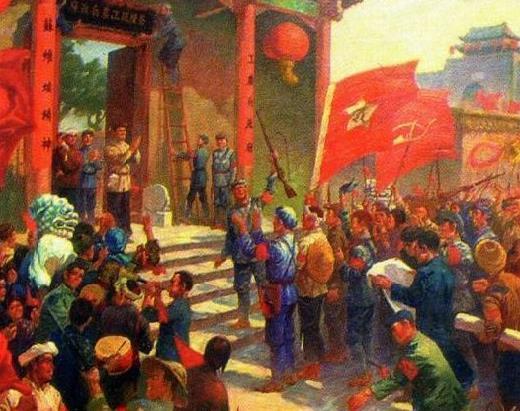After the Maogong Division, many generals in the Red Army entered the Red Fourth Army, and most of them held the position of chief of staff, such as Zhang Zongxun as chief of staff of the 4th Army, Chen Bojun as chief of staff of the 9th Army, and Li Jukui as chief of staff of the 31st Army. At the time of the grand title, Zhang Zongxun, Chen Bojun and Li Jukui were all awarded the rank of general. But there was one person who was an exception, and he was Huang Huxian, who was then the chief of staff of the 30th Army.
Huang Huxian is a native of Shanghang, Fujian Province, and when he was a child, his family was very poor, and he could not come up with money to provide him with education. Huang Huxian first helped his parents to do farm work, and when he was a little older, he began to herd cattle and cut grass for the landlord's family, slept in the cowshed, ate leftovers, and was often scolded by the landlord's wife for no reason, and suffered a lot. In 1929, when the Red Army came to Shanghang, they beat up local tycoons and divided up the land, and the lives of the poor people were greatly improved.

In order to defend the fruits of victory, many young and middle-aged people joined the army, and 15-year-old Huang Huxian also joined the ranks of the Red Army, thus embarking on the revolutionary road. After that, he followed the troops to participate in many anti-encirclement and suppression operations, and with his military achievements, his position was constantly promoted. After the Red First and Fourth Divisions, Huang Huxian was ordered to enter the Red Fourth And serve as the chief of staff of the 30th Army.
Soon after, Huang Huxian followed the Western Route Army across the Yellow River to fight, due to the enemy's outnumber and logistical shortages, the Western Route Army eventually lost, and Huang Huxian unfortunately fell into the hands of the enemy. After the outbreak of the War of Resistance Against Japan, under the vigorous rescue of his superiors, Huang Huxian returned to Yan'an and served as the head of the special agent regiment of the Eighth Route Army Headquarters.
In 1939, Huang Huxian, who was commanding operations on the front line, suddenly received an order to return to Yan'an to study, and it turned out that someone had reported that he had "reneged" after the defeat of the Western Route Army. Later, after an investigation, his superiors believed that he had not "apostatized" but had not shown sufficient firmness, so he was relieved of his duties.
After that, Huang Huxian left the front line of the battle and engaged in logistics support work in the rear, during which he briefly served as the chief of the operations section of the Shaanxi-Gansu-Ningxia-Jinsui Joint Defense Command. After the victory of the War of Resistance Against Japanese Aggression, Huang Huxian came to work in the Jicha Reliao Military Region and successively served as deputy brigade commander, acting chief of staff, and brigade commander.
In August 1947, Huang Huxian became the chief of staff of the 8th Column of the Northeast Democratic Coalition Army, and successively partnered with Huang Yongsheng and Duan Suquan. After the Liaoshen Campaign, Huang Huxian served as the commander of the 134th Division of the 45th Army of Siye, and led his troops to participate in the Battles of Pingjin, Hengbao and Guangxi.
After the outbreak of the War to Resist US Aggression and Aid Korea, Huang Huxian served as the commander of the tank division and played the prestige of the armored units of the Volunteer Army on the Korean battlefield. In 1955, when the title was awarded, Huang Huxian's situation made Luo Ronghuan, who was in charge of the title evaluation, difficult.
During the Red Army, he served as the chief of staff of the army and during the War of Resistance Against Japanese Aggression, and this qualification can be awarded to the general. However, during the period of the War to Resist US Aggression and Aid Korea, he was still only a division commander, and this post was barely awarded to major generals. Coupled with the influence of the capture after the defeat of the Western Route Army, Huang Hu showed that what title to give was indeed a difficult problem. Eventually he was not awarded the rank of major general for 55 years, and a year later he was awarded the rank of major general. In 1986, General Huang Huxian died of illness at the age of 72.